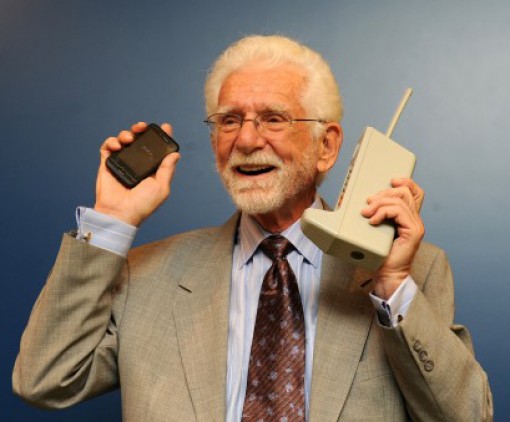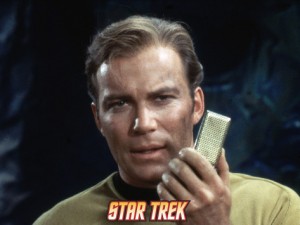 The 2013 Marconi Award for contributions to information technology and communications science was awarded on April 5th, 2013 to a 20th century giant of the information revolution and its a reasonable certainty that you have never heard of him. Martin Cooper, a Chicago born Illinois Institute of Technology trained engineer, however, probably did more to affect the way you live today than you can possibly imagine. Martin Cooper will receive the Marconi Prize in October in Bologna, Italy for his critical vision and work in inventing and developing an indispensable modern tool, the mobile cell phone, and like his award benefactor Guglielmo Marconi, inventor of the radio transmission, forever changed the way information could be shared and propagated, to the everlasting benefit of humanity. For devising a practical tool that has brought the world to any individual wherever they may be, Martin Cooper readily deserves to be Ramparts’ People We Should Know #23.
The 2013 Marconi Award for contributions to information technology and communications science was awarded on April 5th, 2013 to a 20th century giant of the information revolution and its a reasonable certainty that you have never heard of him. Martin Cooper, a Chicago born Illinois Institute of Technology trained engineer, however, probably did more to affect the way you live today than you can possibly imagine. Martin Cooper will receive the Marconi Prize in October in Bologna, Italy for his critical vision and work in inventing and developing an indispensable modern tool, the mobile cell phone, and like his award benefactor Guglielmo Marconi, inventor of the radio transmission, forever changed the way information could be shared and propagated, to the everlasting benefit of humanity. For devising a practical tool that has brought the world to any individual wherever they may be, Martin Cooper readily deserves to be Ramparts’ People We Should Know #23.
Imagine a world without your cell phone and the bounty of links to the world it provides. The phone allows you the power of a computer, the access of a communicator through phone and voice mail, the precise awareness of your location in the world around you through GPS, the networking capability of texting and e-mail, all provided in a device that fits into a shirt pocket. Martin Cooper visualized it when the world of communication tethered you to a phone number linked by wire to a location and limited to the capacity of the wire to transmit sound or information, but not both simultaneously. This was the world of 1973, when Mr. Cooper,an engineer for the Motorola Corporation, proved that phone communications could be transmitted in wireless fashion through a portable device powered by its own battery.
The Motorola Corporation was a great exemplar of the power of private capitalism to innovate, something that has been lost in this modern time of government overbearance with shepherding new technologies with companies such as Solyndra. It is estimated that Motorola invested over a hundred million dollars in 1970s currency value in Mr. Cooper’s team of visionaries from 1965 until 1993 when the first dollar of profit was finally realized in Cooper’s creation, without a hint that the technology would actually take hold. Mr. Cooper’s team worked to convert ideas into practical devices. He stated a large part of his inspiration was the entirely fictional device known as the hand held communicator, a device conceived out of fantasy by Gene Roddenberry, the producer of the Star Trek television show, to allow its fictional characters to communicate with each other and with their ship effortlessly.

The challenge was immense. What passed for the zenith of mobile communication was the car phone, a device that needed engine power and over thirty pounds of installed equipment to work, not exactly the kind of technology that would appeal to the individual walking about. Cooper’s first device was a behemoth, weighing 2.5 pounds, 10 inches long, with a charge lasting twenty minutes and requiring a ten hour recharge, and was indecorously referred to as the “box” or “shoe” phone. But in the fateful year of 1973, Mr. Cooper walked the streets of New York in a public demonstration of his phone, wirelessly called and wirelessly received a phone call, and personal communication was changed forever. From the first practical application of Motorola’s first successful models in the late 1980’s, morphing into the spectacularly successful “flip phone” of the 1990’s, to the incredible power of the iPhone today, dramatic advances in battery capacity, solid state, broadband capacity, and miniaturization were required. But in the space of thirty years, Martin Cooper converted the world to the idea that all information could follow an individual wherever they were, and to the immeasurable benefit of their personal freedom.
Want to know the effect of Martin Cooper’s vision on our way of life? The International Telecommunication Union estimated by 2012 that there were 6 billion mobile subscriptions in the world and that the developed world had achieved the saturation point of over one mobile subscription per person. 87% of the world now has mobile communication capacity and over 73% of what was once referred to as the developing world. Martin Cooper’s vision has helped make mobile communications indispensable, practical, and affordable to almost every person on earth that desires it. It looks like that 100 million spent by Motorola on Martin Cooper was a very good bet indeed.
One can never fail to be amazed at how humans create reality out of fantasy through the simple but magnificent force of their will and intellect. Martin Cooper, Ramparts People We Should Know #23, proves again that solutions to overwhelming problems are best served by getting out of the way of the incredible capacity of the marketplace to invest in and vet ideas, without the bias of governments that seek to politically control the process. Despite the billions and billions of tax dollars spent to “invent” a cure to fossil fuels, the likely solution will come from some unknown, obscure thinker, who was inspired by ideas entirely of their own creation, and driven entirely by their own intellectual need to solve the problem. Somewhere out there, the next Martin Cooper will change the way we live forever.